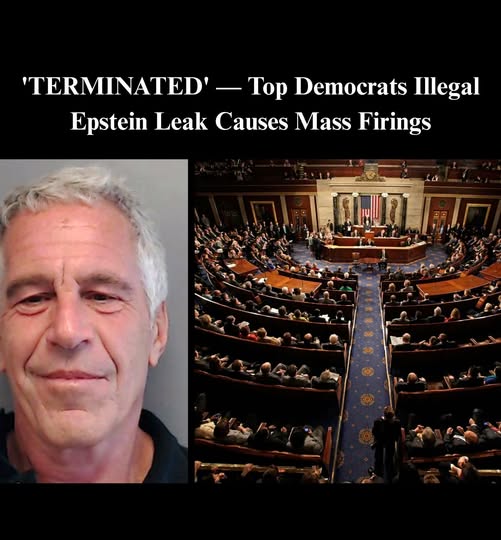Top Democrat Faces Legal Firestorm Over Leaked Maxwell Emails!
A major constitutional and ethical firestorm has erupted on Capitol Hill, ensnaring Rep. Jamie Raskin (D-MD), the influential ranking Democrat on the House Judiciary Committee, following his highly publicized release of a tranche of private prison correspondence written by the convicted human trafficker Ghislaine Maxwell. The fallout has been immediate and severe, leading to the termination of multiple federal prison employees and drawing ferocious condemnation from Maxwell’s legal team, who accuse the congressman of engaging in a “gross abuse of power.”
The controversy centers on the fact that the emails were not obtained through standard legal discovery or subpoena, but were reportedly accessed without authorization and illegally passed from inside Federal Prison Camp Bryan in Texas directly to Raskin’s congressional office. This unauthorized disclosure violated federal confidentiality standards governing inmate communications.
Leah Saffian, the attorney representing Maxwell, did not mince words in her sharp rebuke of Raskin, a seasoned attorney and former law professor. “The congressman is a ranking member of the House Judiciary Committee, an attorney and law professor,” Saffian stated emphatically on Friday. “He must be aware that his conduct undermines the whole legal process. His action should be a matter for professional disciplinary action.” Saffian confirmed that the Federal Bureau of Prisons (BOP) had already terminated multiple employees implicated in the unauthorized access and subsequent leak, an action that underscores the gravity of the internal breach.
Saffian asserted that the employees’ decision to share the messages—and Raskin’s deliberate publication of them—amounted to a clear “breach of constitutional protections, including the First, Sixth, and Fourteenth Amendments afforded to all prisoners.” She framed the incident as a systemic failure to protect her client’s fundamental rights.
The content of the leaked emails provides a curious contrast to the public narrative of Maxwell’s incarceration. They revealed an uncharacteristic sense of relief and optimism about her current accommodations at the Bryan facility, suggesting a markedly different environment than the dire conditions she faced at the previous Florida prison where she was held after her conviction.
“The food is legions better, the place is clean, the staff responsive and polite,” Maxwell wrote in one message, painting a picture of stability and comparative comfort. “I have not seen a single fight, drug deal, passed-out person or naked inmate running around. I am much, much happier here and more importantly, safe.” In another message, she directly mocked her old surroundings, writing caustically: “The kitchen looks clean too—no possums falling from the ceiling to fry on ovens and mingle with the food being served.”
Saffian argued that this disclosure was “just the latest example of Ms. Maxwell’s constitutional and human rights being ridden roughshod over.” She recalled that the Justice Department’s inspector general had previously documented the deplorable conditions at the Tallahassee facility, where the BOP had effectively “failed her once.” Now, she argues, “a sitting member of Congress has compounded that failure” by exploiting her confidential communications for political leverage.
Raskin appeared to use the leaked communications to suggest that Maxwell might be preparing a request for clemency from the current Trump administration. In a letter sent to President Trump, Raskin claimed a “whistleblower” had alerted him that Maxwell was drafting a commutation application for review by the administration—an assertion that would politically benefit Raskin by linking a high-profile convicted trafficker to the President.
Saffian forcefully denied this interpretation and claim. “Ms. Maxwell has not requested a commutation or made a pardon application to the second Trump administration,” she affirmed. Instead, Saffian revealed, Maxwell plans to file a petition in Manhattan federal court seeking to overturn her 2021 conviction, now arguing that new evidence has surfaced which “would have had a material impact” on the trial’s outcome. Maxwell, now 63, is serving a 20-year sentence for aiding Jeffrey Epstein in the grooming and trafficking of underage girls.
The political backlash from Republicans on Capitol Hill was swift and pointed. A senior GOP aide on the Judiciary Committee immediately seized on the ethical implications of Raskin’s conduct. The aide argued that Raskin’s decision to publicize private inmate communications “shows a reckless disregard for due process and confidentiality standards that apply across the board.”
The aide added a crucial element of political symmetry: “If the situation were reversed—if a Republican had released private inmate correspondence to damage a Democrat’s narrative—Raskin would be screaming for an ethics investigation.” This critique effectively frames Raskin’s actions as a dangerous, hypocritical precedent for weaponizing congressional oversight tools for partisan ends. Saffian concurred, stating the situation underscores a troubling double standard. “Federal officials are sworn to uphold the law, not weaponize it,” she said. “By exploiting confidential communications, Mr. Raskin has not only compromised my client’s legal rights but set a dangerous precedent for political interference in the justice system.”
Legal experts watching the fallout agreed that the episode raises thorny constitutional questions about the boundaries between congressional oversight authority and individual privacy rights. While members of Congress possess wide latitude to investigate federal agencies and misconduct, the release of specific inmate communications without proper court authorization or compelling public interest could expose Raskin or his staff to potential censure or civil litigation. “This is a gray area that brushes up against due process,” noted one former federal prosecutor, suggesting that even if Raskin’s intent was to force transparency on the BOP system, “the method may have crossed the line.”
As the controversy continues to escalate, Saffian confirmed that Maxwell’s legal team is preparing a formal, multi-pronged complaint. They intend to submit a formal grievance to the Office of Congressional Ethics (OCE) and are seriously considering pursuing civil action against those responsible for the unauthorized release. “This won’t end here,” Saffian declared. “Members of Congress are not above the Constitution.” The fight, she made clear, is not just about Maxwell, but about reinforcing the due process rights that apply equally to every individual under the law.



